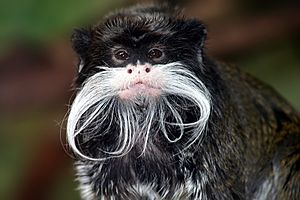Tamarin facts for kids
Quick facts for kids Tamarins |
|
|---|---|
 |
|
| An Emperor tamarin | |
| Scientific classification |
|
| Kingdom: | Animalia |
| Phylum: | Chordata |
| Class: | Mammalia |
| Order: | Primates |
| Suborder: | Haplorhini |
| Infraorder: | Simiiformes |
| Family: | Callitrichidae |
| Genus: | Saguinus Hoffmannsegg, 1807 |
| Type species | |
| Saguinus ursula Hoffmannsegg, 1807
|
|
| Species | |
|
13 species, see text |
|
| Synonyms | |
|
|
Tamarins are small monkeys, about the size of a squirrel! They belong to a group of monkeys called New World monkeys. You can find them in the Saguinus family. Tamarins are related to other small monkeys like lion tamarins and marmosets.
Contents
What Tamarins Look Like
Different kinds of tamarins look very different. Some are almost all black. Others have a mix of black, brown, and white fur. Many species have cool mustache-like hair on their faces.
Their bodies are about 13 to 30 cm (5.1 to 11.8 in) long. Their tails are even longer, from 25-to-44 cm-long (9.8-to-17.3 in). Tamarins usually weigh between 220 to 900 grams (7.8 to 31.7 oz).
One way to tell tamarins apart from marmosets is their teeth. Tamarins have lower canine teeth that are longer than their front teeth. In zoos or special animal centers, tamarins can live for up to 18 years.
Where Tamarins Live
Tamarins live in warm parts of the world. You can find them from southern Central America down through central South America. They live in places like northwestern Colombia, the Amazon basin, and the Guianas.
Tamarin Behavior and Life Cycle
Tamarins make their homes in tropical rainforests. They also live in more open forest areas. These monkeys are active during the day. They spend most of their time in trees. They are very quick, running and jumping through the branches.
Tamarins live in groups. These groups can have as many as 40 members. But usually, a group has about three to nine monkeys. These groups often include one or more families.
Tamarins eat many different things. They are omnivores, which means they eat both plants and animals. Their diet includes fruits and other plant parts. They also eat spiders, insects, small animals, and bird eggs.
Reproduction
A female tamarin is pregnant for about 140 days. She usually gives birth to twins. The adult males, older young, and even younger monkeys in the group help care for the babies. They bring the babies to their mother for feeding.
After about one month, the young tamarins start eating solid food. They stop drinking their mother's milk completely after two to three months. Tamarins become fully grown when they are about two years old. Most tamarin groups have one female who mates with several males.
Scientists have studied how cottontop tamarins work together. They did experiments where two monkeys had to pull handles at the same time to get food. The tamarins pulled the handles more often when a partner was there. This showed that cottontop tamarins are good at cooperating. It suggests they have learned to work together to survive.
Who Hunts Tamarins?
Tamarins spend a lot of time looking for food. But they also need to be very careful. They are always on the lookout for animals that might try to eat them. Because they are small, they can be easy targets. Birds, snakes, and other mammals are some of their predators.
How Scientists Classify Tamarins
Scientists group animals to understand them better. At first, there were ten different kinds of Saguinus tamarins. They were sorted by their facial fur. Later, scientists used dental measurements to group them.
The most recent way of classifying them lists fifteen different species. In 2016, a study of their genes suggested some changes. It showed that some tamarin groups started to become different millions of years ago. Because of this, some scientists moved the saddle-back tamarins to their own group called Leontocebus. Other scientists think the mystax group of tamarins is special enough to be a subgenus called Tamarinus.
Classification
- Genus Saguinus
- S. midas group
- Red-handed tamarin, Saguinus midas
- Black tamarin, Saguinus niger
- Saguinus ursula
- S. mystax group
- Moustached tamarin, Saguinus mystax
- Spix's moustached tamarin, Saguinus mystax mystax
- White-rump moustached tamarin, Saguinus mystax pluto
- Red-capped tamarin, Saguinus pileatus
- White-lipped tamarin, Saguinus labiatus
- Emperor tamarin, Saguinus imperator
- Moustached tamarin, Saguinus mystax
- S. bicolor group
- Pied tamarin, Saguinus bicolor
- Martins's tamarin, Saguinus martinsi
- Martin's bare-face tamarin, Saguinus martinsi martinsi
- Ochraceus bare-face tamarin, Saguinus martinsi ochraceus
- S. oedipus group
- Cotton-top tamarin or Pinché tamarin, Saguinus oedipus
- Geoffroy's tamarin, Saguinus geoffroyi
- White-footed tamarin, Saguinus leucopus
- S. inustus group
- Mottle-faced tamarin, Saguinus inustus
- S. midas group
See also
 In Spanish: Tamarinos para niños
In Spanish: Tamarinos para niños
 | Ernest Everett Just |
 | Mary Jackson |
 | Emmett Chappelle |
 | Marie Maynard Daly |

